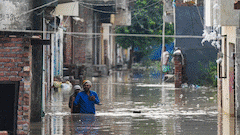Lajpat Nagar To Saket G-Block Among 2 Corridors Under Delhi Metro Phase-IV Get Centre's Approval
The latest move by the Union Cabinet comes in a bid to further improve metro connectivity in the national capital.

The Centre on Wednesday gave its approval for two new corridors of Delhi Metro's Phase-IV project -- Lajpat Nagar to Saket G-Block and Inderlok to Indraprastha. The latest move by the Union Cabinet comes in a bid to further improve metro connectivity in the national capital.
According to an official statement, the total cost of the project of these two corridors is Rs 8,399 crore, which will be sourced from the Centre, the Delhi government, and international funding agencies. The Cabinet chaired by Prime Minister Narendra Modi approved the new corridors, to be completed by March 2026 in stages.
Speaking to reporters at a press briefing, Union Minister Anurag Thakur said that with the new corridors, the national capital region will have a total Metro network of around 450 km as against the present 427 km.
Elaborating on the two new corridors, Anurag Thakur said that of the total expenditure of Rs 8400 crore, the Central Government will spend Rs 1,547 crore, the Delhi government will spend Rs 1,987 crore, Rs 4,309 crore will come from JICA as a loan, Rs 333 crore from internal accruals of DMRC, and Rs 195 crore through the PPP component.
He further stated that once the corridors are complete, a total of 2.5 lakh people will travel on these lines. A total of 65–70 lakh people travel through the metro network in Delhi currently. According to the official statement, these two lines will have a combined length of 20.762 km.
The Inderlok-Indraprastha corridor will be an extension of the Green Line and will provide interchange with the Red, Yellow, Magenta, Violet, and Blue Lines and Airport Line, while the Lajpat Nagar-Saket G Block corridor will connect the Silver, Magenta, Pink, and Violet Lines.
The Lajpat Nagar-Saket G Block corridor will be entirely elevated and will have eight stations. The Inderlok-Indraprastha corridor will have 11.349 km of underground lines and 1.028 km of elevated lines with 10 stations.
"The Inderlok-Indraprastha Line will provide enhanced connectivity to the Bahadurgarh region of Haryana, as commuters from these areas will be able to travel on the Green Line to directly reach Indraprastha as well as various other areas of central and east Delhi," the official statement read.
Eight new interchange stations will come up on these corridors at Inderlok, Nabi Karim, New Delhi, Delhi Gate, Indraprastha, Lajpat Nagar, Chirag Dilli, and Saket G Block. These stations will significantly improve inter-connectivity among all the operational lines of the Delhi Metro network, it further stated.
The Delhi Metro is already constructing a network of 65 km as part of its fourth phase of expansion. Currently, the DMRC operates a network of 391 km, consisting of 286 stations. The Delhi Metro is now one of the fastest-growing networks in the world.
The Delhi Metro Rail Corporation Limited (DMRC) has already started the pre-bid activities and preparation of tender documents.
Related Video
Breaking News: Fire Breaks Out at DDA Flats in Delhi Kalkaji, Seven Residents Safely Evacuated






































